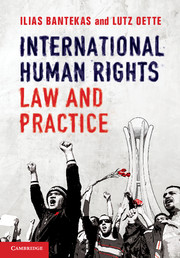Book contents
- Frontmatter
- Contents
- List of abbreviations
- Table of Cases
- Introduction
- 1 International human rights law and notions of human rights: foundations, achievements and challenges
- 2 International human rights law: the normative framework
- 3 Human rights in practice
- 4 The United Nations Charter system
- 5 The UN human rights treaty system
- 6 Regional human rights treaty systems
- 7 Individual complaints procedures
- 8 Civil and political rights
- 9 Economic, social and cultural rights
- 10 Group rights: self-determination, minorities and indigenous peoples
- 11 The human rights of women
- 12 The right to development, poverty and related rights
- 13 Victims’ rights and reparation
- 14 The application of human rights in armed conflict and the international criminalisation process
- 15 Human rights and counter-terrorism
- 16 Non-state actors and human rights
- 17 Globalisation and its impact on human rights
- Index
- References
14 - The application of human rights in armed conflict and the international criminalisation process
- Frontmatter
- Contents
- List of abbreviations
- Table of Cases
- Introduction
- 1 International human rights law and notions of human rights: foundations, achievements and challenges
- 2 International human rights law: the normative framework
- 3 Human rights in practice
- 4 The United Nations Charter system
- 5 The UN human rights treaty system
- 6 Regional human rights treaty systems
- 7 Individual complaints procedures
- 8 Civil and political rights
- 9 Economic, social and cultural rights
- 10 Group rights: self-determination, minorities and indigenous peoples
- 11 The human rights of women
- 12 The right to development, poverty and related rights
- 13 Victims’ rights and reparation
- 14 The application of human rights in armed conflict and the international criminalisation process
- 15 Human rights and counter-terrorism
- 16 Non-state actors and human rights
- 17 Globalisation and its impact on human rights
- Index
- References
Summary
Introduction
This chapter discusses the development and application of two bodies of international law; namely international humanitarian law (IHL) and international criminal law and their interrelationship with human rights law. The killing of a civilian by a soldier during an armed conflict, for example, may constitute an IHL violation and a violation of the (human) right to life. This chapter examines this relationship, which is of particular importance for the protection of civilians, especially where the applicability of IHL is contested or where IHL constitutes an exception to certain rights, such as the right to life, or fails to prevent and/or provide effective remedies for violations. It seeks to identify the scope of application of the two bodies of law and demonstrate the degree to which the two can be reconciled. Moreover, a special case is made for the law applicable in situations of military occupation whereby human rights are subordinate to IHL. Despite this subordination, in practice because international human rights tribunals are not mandated to apply humanitarian law they necessarily interpret and enforce the rights of the victims on the basis of those human rights norms found in their respective statutes. As a result, the jurisprudence of human rights tribunals is not always consistent with IHL. Yet, such tribunals are hard pressed to accept jurisdiction over situations which would otherwise be resolved on the basis of IHL. This chapter therefore goes on to discuss the exercise of extraterritorial jurisdiction by human rights tribunals. This is particularly significant because European states involved in the occupation of Iraq or other territories generally argue that the ECHR is inapplicable. The ECtHR has taken a different approach. The parameters and consequences of this approach will be highlighted.
- Type
- Chapter
- Information
- International Human Rights Law and Practice , pp. 567 - 612Publisher: Cambridge University PressPrint publication year: 2013

